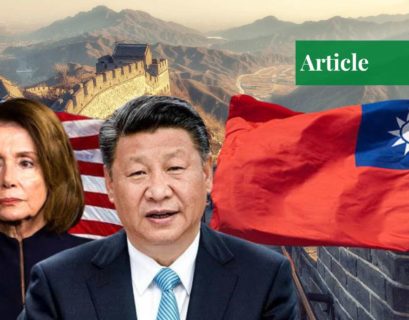Mr Khalid Kayani is a highly educated United Arab Emirates-based Pakistani businessman. During his business career, he has invested in and created businesses in Russia, the United Arab Emirates, West & East Africa, Europe, China, and Pakistan.
The concept of sovereignty is tied to individual freedom which is experienced by the sanctity of the individual space. Individual space refers to personal time, physical surroundings, and mental autonomy which enables the following:
- Autonomy and Independence: Having personal space fosters autonomy and independence. When individuals have the freedom to make decisions about how they spend their time and what activities they engage in, they develop a sense of agency and self-reliance.
- Creativity and Innovation: Individual space allows uninterrupted thinking, brainstorming, and creativity. Solitude provides a conducive environment for generating new ideas, solving problems, and exploring unconventional approaches to various challenges.
- Emotional Regulation: Spending time alone helps individuals regulate their emotions. It provides an opportunity to process feelings, manage stress, and develop healthy coping mechanisms. Emotional resilience is crucial for maintaining balanced mental health.
- Personal Interests: Individual space enables individuals to pursue their passions and hobbies without judgment or external pressures. Engaging in activities they enjoy contributes to a sense of fulfillment and satisfaction.
- Healthy Relationships: Well-rounded personalities arise from individuals who are comfortable with themselves. Having personal space allows individuals to develop a strong sense of self which leads to healthier and more genuine relationships with others. They can establish boundaries and communicate their needs effectively.
- Reduced Stress: Personal space acts as a buffer against the demands of daily life. It offers a respite from external pressures, giving individuals an opportunity to relax and recharge which in turn contributes to overall well-being.
- Decision-Making: Spending time in individual space allows for focused decision-making. It helps individuals weigh options, consider consequences, and make choices aligned with their values and aspirations.
- Balanced Well-Being: Balancing time spent with others and time spent alone leads to a more holistic sense of well-being. Social interactions are important, but individual space helps maintain a healthy equilibrium and prevents burnout.
Individual space transforms into collective space in the form of organizations, associations, guilds, and other business entities through a process that involves combining individual efforts, skills, and resources to achieve common goals. This transformation process occurs as follows:
- Shared Vision and Goals: In the transition from individual space to collective space, individuals with similar interests, skills, or objectives come together based on a shared vision and common goals. This shared purpose becomes the foundation upon which the collective entity is built.
- Pooling of Resources: Individual space involves personal resources such as time, expertise, and knowledge. In the collective space, these resources are pooled together to create a more substantial and impactful presence. Financial resources, equipment, skills, and talents are combined to achieve larger objectives.
- Collaborative Efforts: The shift to collective space encourages collaboration among individuals with diverse skills and backgrounds. This collaborative approach leverages the strengths of different team members to achieve outcomes that might not be possible in individual spaces.
- Learning and Skill Development: Collective spaces offer opportunities for learning and skill development through shared experiences, training programs, and interactions with others. Members can benefit from exposure to new perspectives, ideas, and practices.
- Achievement of Scale: Collective spaces allow for the achievement of scale that individuals cannot attain on their own. Business organizations, for example, can expand their operations, reach broader markets, and offer a wider range of products or services.
Overall, the transition from individual space to collective space involves the aggregation of individual contributions, resources, and efforts to create a unified and coordinated entity. This transformation allows for the pursuit of larger objectives, increased impact, and the realization of goals that extend beyond what individuals can achieve in their respective personal spaces.
A collective space (organizations, associations, guilds families, clubs, etc.,) plays a crucial role in fostering innovation and the creation of wealth. A collective’s structure, culture, and processes can significantly influence its ability to innovate and generate economic value. Some of the ways the collective (organization) space contributes to these aspects are:
- Diverse Talent Pool: An organization brings together individuals with diverse skills, backgrounds, and perspectives. This diversity fosters creativity and the exchange of ideas, leading to innovative solutions to complex problems.
- Collaboration and Cross-Pollination: Organizational space encourages collaboration among individuals from different departments and disciplines. Interactions and knowledge-sharing between individuals with different expertise spark new ideas and approaches.
- Intellectual Property Management: Organizational space facilitates the management and protection of intellectual property, such as patents, trademarks, and copyrights. This protection encourages innovation by ensuring that creators are rewarded for their innovative efforts.
- Wealth Creation: Successful innovation leads to the creation of wealth. Innovative products or services can generate new revenue streams, capture market share, and contribute to the organization’s financial growth.
- Economic Growth: Organizations that consistently innovate contribute to economic growth at various levels, including local economies and industries. Such organizations drive job creation and stimulate economic activity.
In summary, organizational (collective) space provides the structure, culture, and resources necessary for fostering innovation and creating wealth. A cohesive and nurturing organizational environment encourages creativity and collaboration. The pursuit of novel ideas leads to the development of innovative products, services, and solutions that drive economic success.
The concept of individual sovereignty and its aggregation to define national sovereignty emphasizes the importance of individual rights and freedoms in shaping a nation’s identity and strength.
- Empowerment of Individuals: Recognizing and protecting individual sovereignty empowers citizens to actively participate in the nation’s development. When individuals have the freedom to express themselves, engage in meaningful pursuits, and make informed choices, they contribute to the overall growth and progress of the nation.
- Collective Identity: The collection of individual sovereignties reflects the diversity and richness of a nation’s population. Each person’s unique experiences, cultures, and perspectives contribute to the collective identity of the nation, making it more vibrant and inclusive.
- Democratic Values: Respecting individual sovereignty aligns with democratic principles. In democratic societies, the rights of individuals are upheld and their voices are heard through the electoral process. This strengthens the democratic foundations of the nation.
- Innovation and Progress: When individuals are free to pursue their interests and ideas, it can lead to innovation, creativity, and progress. Nurturing individual sovereignty encourages entrepreneurship, research, and the generation of new ideas that benefit the nation as a whole.
- Social Cohesion: Protecting individual sovereignty while fostering a sense of national unity leads to greater social cohesion. When individuals are respected and valued for their unique contributions, it can lead to stronger bonds among citizens.
- Human Rights: Recognizing individual sovereignty aligns with the protection of fundamental human rights. These rights, such as freedom of speech, expression, and privacy, are essential for personal dignity and well-being.
- Responsibility and Accountability: Respecting individual sovereignty doesn’t negate the importance of accountability to the larger community. Balancing individual freedoms with responsibilities to society ensures that personal actions do not harm the collective good.
- Cultural Enrichment: Embracing individual sovereignties contributes to cultural diversity and enrichment. Different traditions, languages, and ways of life create a more vibrant and dynamic national culture.
- Global Perspective: Nations that protect individual sovereignty gain respect on the global stage. Demonstrating a commitment to human rights and personal freedoms enhances a nation’s reputation and influence in international relations.
- Peace and Stability: Respecting individual sovereignty contributes to societal harmony by reducing conflict arising from the suppression of personal freedoms. Societies that value individual rights tend to be more stable and peaceful.
A deeper understanding of the relationship between individual sovereignty and national sovereignty shows that the concept of sovereignty starts from an individual’s personal space and his/her sovereignty, and not the other way around. All the national institutions like governments, judiciary, and regulatory bodies should design/reform their framework accordingly.
If you want to submit your articles, research papers, and book reviews, please check the Submissions page.
The views and opinions expressed in this article/paper are the author’s own and do not necessarily reflect the editorial position of Paradigm Shift.



















